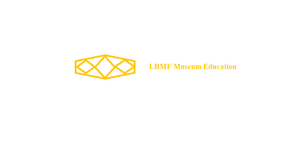Early Access: July 28, 2021
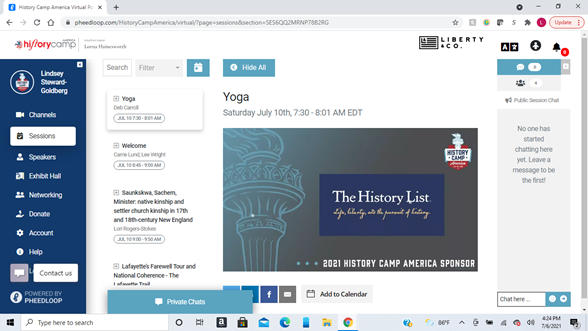
Earlier this month I attended History Camp America, which was their first national History Camp virtual conference. It is produced by The Pursuit of History, a non-profit organization that engages adults in conversation about history and connects them with historic sites in their communities, and across the country through innovative in-person and online programming. There were more than 45 sessions that included but were not limited to presentations, historic site tours, history walks, culinary history demonstrations, trivia, and yoga. According to their website, this conference is designed to be a casual conference for adults, teenagers and children that are students, teachers, professors, authors, bloggers, reenactors, interpreters, museum and historical society directors and board members, genealogists, and everyone else, regardless of profession or degree, who is interested in and wants to learn more about history.
Like previous virtual conferences, they were hosted on platforms designed to run their conferences; History Camp used the event automation Pheedloop which made organizing conferences, meetings, and trade shows easy with event management software that powers everything from mobile apps, registration, touch-free check-in, and live streaming, to floor plans, sponsors, badge printing, and networking since 2015. I decided to attend History Camp this year after I discovered their website because I wanted to learn what a conference that is not hosted by a museum association would be like to experience. I also wanted to participate in something that appeals to my interested in history and that is different from professional development programs I have attended in the past. It is also important for history and museum professionals in the field to see how people are currently studying history and how they are interpreting history since the history and museum field are discussing the 250th commemoration of American Independence and a part of the discussion about the commemoration is to work on helping the people learn how to do history, in other words how to do their own historical research of the communities they live in. The following are a sample of sessions I attended during History Camp America.
One of the sessions I attended was Saunkskwa, Sachem, Minister: native kinship and settler church kinship in 17th and 18th-century New England led by Lori Rogers-Stokes, an independent scholar of 17th-century New England and the author of Records of Trial from Thomas Shepard's Church in Cambridge, 1683-1649: Heroic Souls (published by Palgrave Macmillan). Rogers-Stokes shared her work in process research by discussing the political records and Congregational church records from 17th-century Massachusetts. Her presentation focused on sharing the similarities and differences she found on how the Algonquin people and English colonists defined and valued kinship; she revealed that, according to her research, the puritan church defined kinship in a similar way to indigenous kinship which led her to believe there was a potential connection that could have been a fruitful common ground for cooperation and respect but was unfortunately lost. I thought the content was interesting and I chose to attend this session because I wanted to expand my knowledge on indigenous history; while the session focused on comparing the Algonquin people and English colonists views on kinship, it is an introduction to the Algonquin culture and history. I look forward to hearing about her completed work on this research.
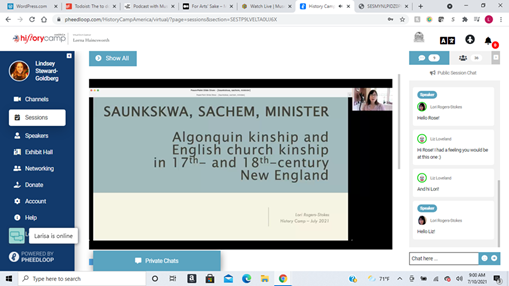
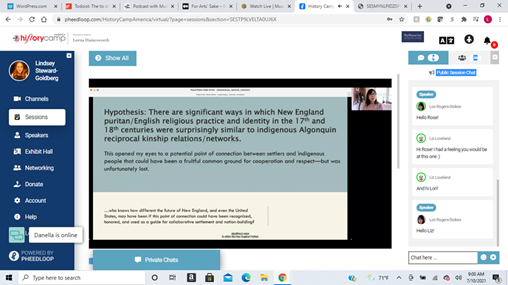
Once that session was complete, I moved on to a short spotlight session introducing The Daily Bellringer created by Jared Bruening. The Daily Bellringer provides short video overviews of U.S. History topics, and they are designed to be used for grades 5-12 as warm-ups, reviews, or introductions to content. I will go more in depth about The Daily Bellringer in a future post. This was not the only spotlight that occurred during History Camp America.
There was also a spotlight on History Dame created by Larisa Moran who is a history blogger and creator of History In Under A Minute©. History In Under A Minute is a series on YouTube that discusses a variety of topics in history in less than a minute. She is also a volunteer with The Pursuit of History and regional editor for The History List, the platform historical societies, historic sites, and other organizations use to attract and engage visitors and members through things including but not limited to listings of programs and exhibits, and resources for organizations of all sizes that provide research, tool, and insight to support history programming across the country. I will also explore more of History Dame in a future post.
Another session I attended was "Thrown into the pits”: how were the bodies of the nineteen hanged Salem “witches” really treated? and the speaker was Marilynne K. Roach, author of The Salem Witch Trials: a Day-by-Day Chronicle of a Community Under Siege, and Six Women of Salem. She is a member of the Gallows Hill Group that verified the location of the hangings, a discovery Archaeology magazine hailed as one of 2016’s top ten discoveries in the world. Roach discussed her experience taking a closer look at the court records that may disprove assumptions of what happened to the bodies of those hung during the Salem Witch Trials in 1692. I thought this was an important session to attend not only because of my interest in Salem’s history but this is an example of why historical research is significant. Popular accounts starting with 19th century historian Charles Upham’s statement that the deceased were “undoubtedly all thrown into pits dug among the rocks” were usually based in available resources or lack thereof, and when records are discovered the interpretation begins to change to reflect what the primary sources state about moments in history such as the Salem Witch Trials.
During lunch, there was a demonstration and a short session that focus on the history of food. In this demonstration, Chef Justin Cherry cooked a recipe for crab cake in Dressed Crab - An Early American Favorite and participants had access to the recipe so they could follow along making their own crab cake. Chef Justin Cherry is the Chef/Owner of Half Crown Bakehouse which is a mobile 18th-century clay oven that specializes in colonial foodways. The recipe he used during the demonstration came from a manuscript written by Anne Chase in 1811; Anne Chase was the daughter of Samuel Chase, one of the signers of the Declaration of Independence. I thought it was interesting since not only participants learn more about history, but they can also prepare their own crab cakes as they watch. To my memory, I have not participated in a demonstration like this one before.
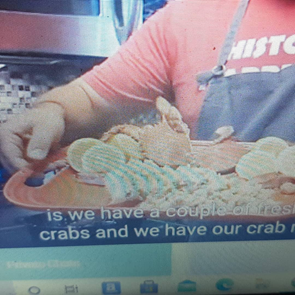
In the next demonstration, Sarah Lohman shared photographs and discussed the history of soda fountains in Soda Fountain Favorites. Sarah Lohman is a culinary historian and the author of the bestselling book Eight Flavors: The Untold Story of American Cuisine, and she focuses on the history of food as a way to access the stories of diverse Americans. She focused her presentation on food history in New York and provided recipes of the classic sodas she talked about so participants can make them at home. Lohman shared stories behind some of the favorite fountain drinks including the egg cream and the popularity of seltzer, Dr. Brown’s Soda (specifically Cel-Ray), the Lime Rickey, and the Purple Cow. During the session, I recalled the first time I tried an egg cream when I first visited my then boyfriend (now husband) on Long Island.
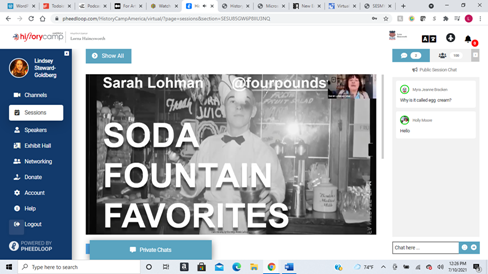
After attending the sessions live, I decided to take advantage of the recorded sessions so I can revisit the sessions and listen to other sessions that I did not attend on the day of the conference. I included a pdf file of the itinerary History Camp released to provide an idea of topics that were discussed, tours given, and demonstrations performed. I will also elaborate in future posts about other sessions I attended and tours of historic sites I participated in.
Links:
